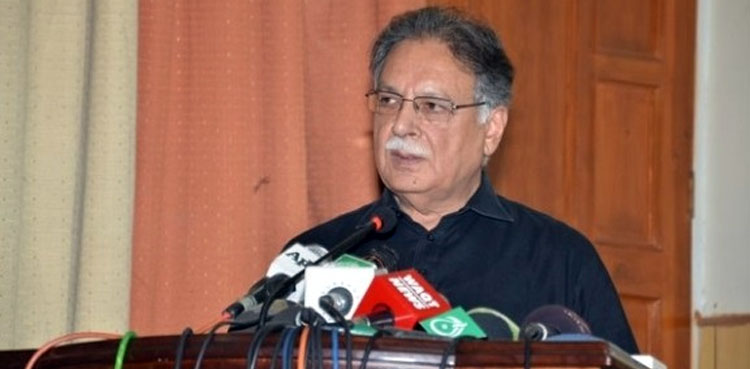ISLAMABAD: Chief Justice of Pakistan (CJP) Umar Ata Bandial on Tuesday, while hearing a petition against the amendments in the National Accountability Bureau (NAB) law, said that the matter will ultimately go back to the parliament for discussion.
A three-member bench of the Supreme Court (SC), headed by Chief Justice Umar Ata Bandial, including Justice Ijazul Ahsan and Justice Mansoor Ali Shah, was hearing the petition filed by Imran Khan against the NAB amendments.
The apex court has sought a response from the law ministry, NAB and other parties.
The court asked Imran Khan’s counsel Khawaja Haris if the statement of the law minister was accurate when he said the current amendments are in line with past SC verdicts?
In response, Haris stated that the amendments are not in accordance with the decisions of the SC. Rather, he contended they stand in conflict with past verdicts.
The counsel further added that most of the cases probed by the NAB are either related to abuse of power or assets beyond means but after the latest amendments, the anti-graft watchdog will not be able to ‘nab’ anyone for extending undue favor to anyone unless the suspect himself is the beneficiary of the favor.
During the hearing, Justice Mansoor Ali Shah pointed out that the amendments were made by the parliament within its legal function.
He asked whether the counsel believed that the lawmakers should not be allowed to exercise their prerogative.
He asked if the court could restore the death penalty if the parliament abolishes it.
In reply, Imran’s counsel said that the matter of abolishing the death penalty was different and posed a counterargument that if the national law-making body decides to do away with murder as a crime, would the court allow it to happen?
He argued that the new amendments infringed on the basic rights of the citizens as it will allow those dealing a blow to the national treasury and promoting corruption will be let off the hook.
The legal counsel implored the court to note that if a common person is subject to the law for monetary embezzlement a rich person should also be held accountable for similar crimes.
The CJP suggested that the petitioner highlight all those amendments which infringe on the fundamental rights of the people first while maintaining that NAB amendments have not dismissed the offence of abuse of power.
During Tuesday’s hearing, Justice Ijazul Ahsan observed that many amendments are passed by the parliament in haste and noted that the application of the new NAB amendments in retrospect up to 1985 would mean that all pending cases under the old law will now stand abolished.
He also inquired from the bench whether legislative powers of the parliament can be reviewed by a court? Or a law benefiting certain persons not be challenged?
Justice Ijazul Ahsan further stated that the NAB law is not exclusive to public office bearers and the work of the government has been affected by the amendments, creating obstacles in many cases.
He added that the court retains the power to annul a law made to appease certain individuals.
The chief justice also summoned Shah Mehmood Qureshi to the stand and remarked that his counsel had raised several key points therefore the court will seek replies from the respondents in the case regarding the issues in question.
“You have the trust of the people. Think about the country, the nation and the constitution, if the parliament is active then democracy thrives,” the CJP told the former foreign minister, adding that difference of opinions on NAB amendments must be discussed on the floor of the national assembly.
Justice Bandial also stressed the need to put personal preferences aside in matters related to the country or public interest.
He inquired whether PTI had a strategy to get the country out of trouble, and asked Qureshi to come prepared with answers during the next hearing.
Meanwhile, the PTI leader told the court that the matter related to the NAB amendments had been debated in a parliamentary committee for several hours.
At this, Justice Ijazul Ahsan responded that the PTI stalwart is referring to the deliberations done prior to the submission of no-confidence motion against Imran Khan.
Justice Mansoor Ali Shah also expressed disdain that the trust people placed with Qureshi as their representative in the assembly had been breached.
It is worth noting that the apex court has asked the government to explain why the amendments were not thoroughly debated in the national assembly before being passed.


















































